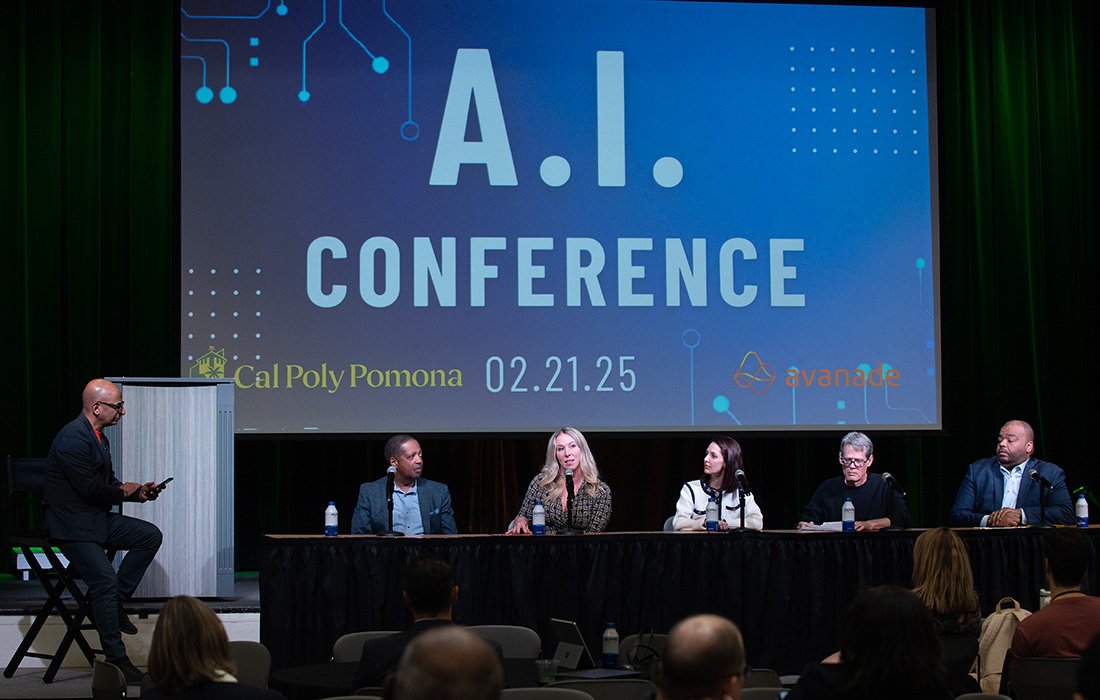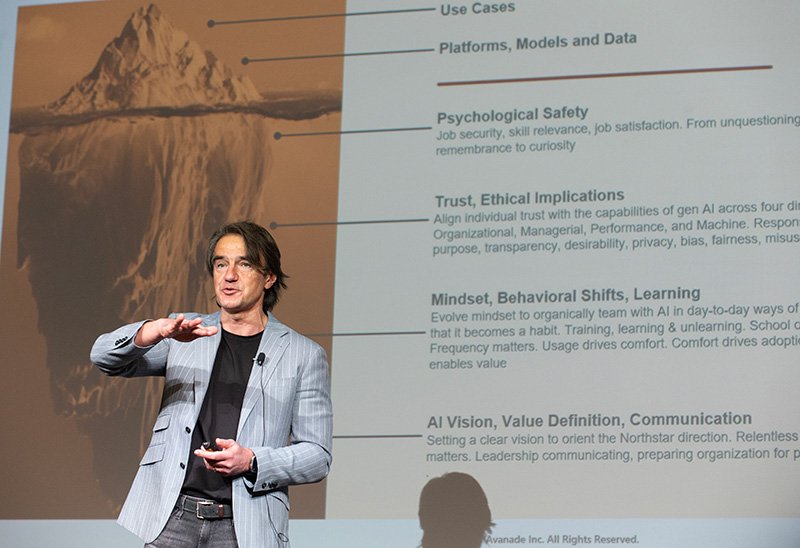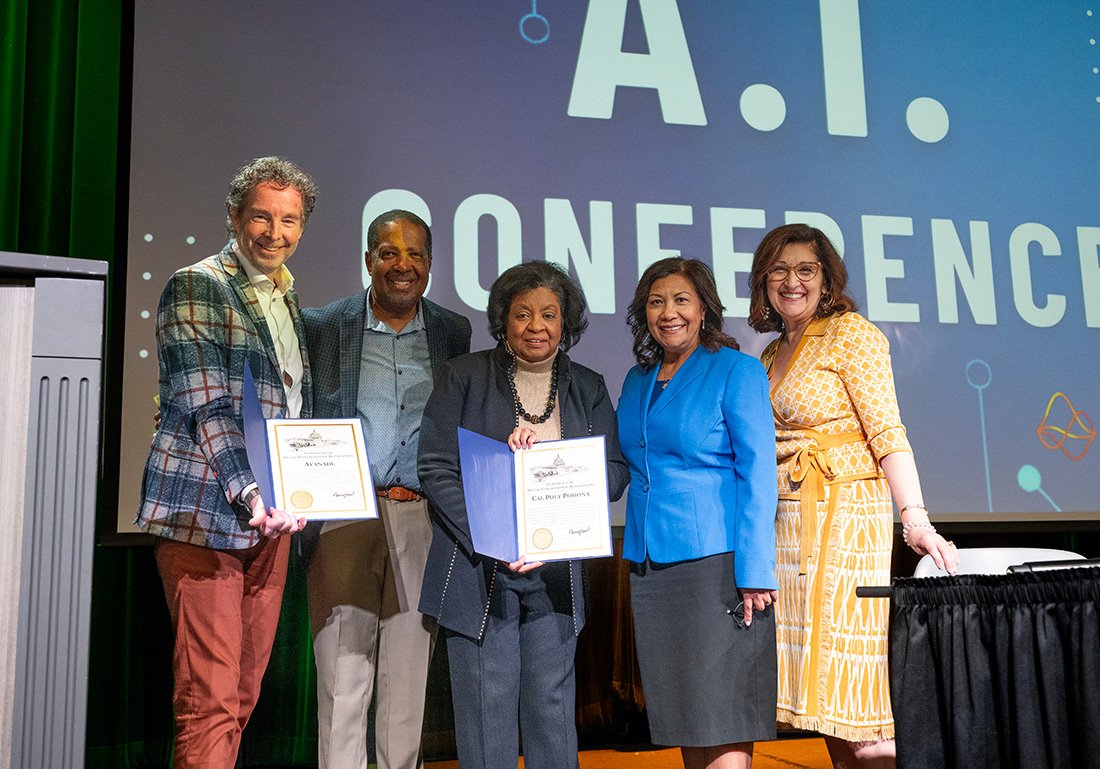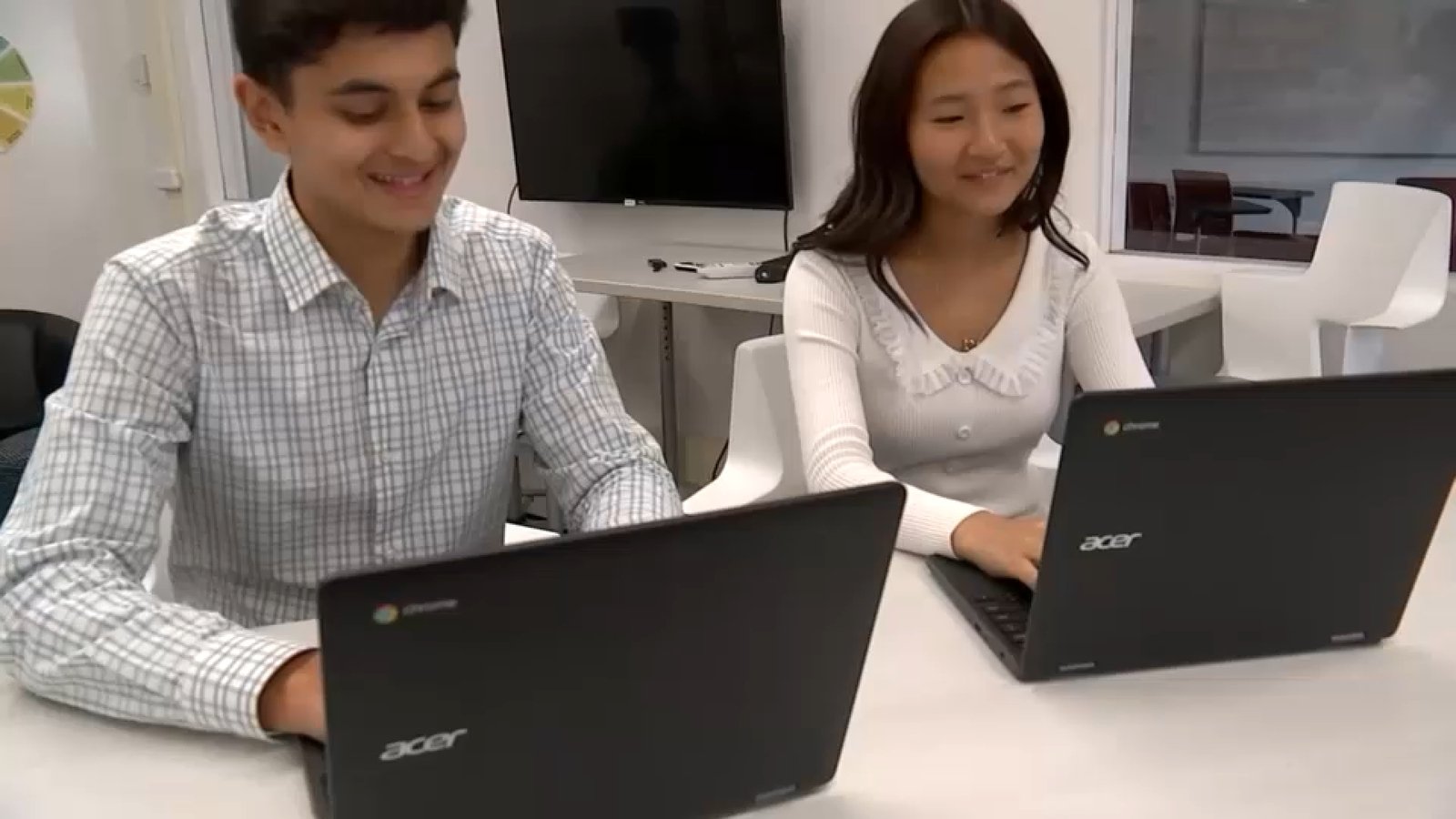Education
CPP to Champion Artificial Intelligence Education Initiatives

From new artificial intelligence-related academic programs to a public-private partnership to workshops for faculty and events for students, Cal Poly Pomona aims to be at the forefront of AI innovation.
The university celebrated those efforts Feb. 21, hosting a gathering of industry experts, students, Congresswoman Norma Torres and academic professionals at the inaugural Artificial Intelligence (AI) Conference. Cal Poly Pomona’s AI push comes at a time when CSU Chancellor Mildred Garcia has announced efforts to position the 23-campus system as the nation’s first and largest AI-powered university system.
Jeff Cox, interim executive director for institutional strategy and engagement at CPP, emphasized the conference’s focus on preparing students for future job markets.
“We knew it was important for students to be prepared for their future career success,” Cox said. “They are going to interact with this technology in their jobs, and giving them hands-on knowledge and experience is of the utmost importance, as well as making sure that Cal Poly Pomona provides education opportunities and training.”
The conference included a networking mixer, during which academic departments, student clubs and offices showcased the current use of AI on campus. Students from Management Information Systems Student Association (MISSA) and Forensics and Security Technology (FAST) shared their current projects and opportunities to get involved.
Also actively working the conference was Temi, an AI robot hosted by Avanade that helped passersby learn more about the company, a leading global provider of innovative digital services and business solutions. Temi can work in different industries and perform several tasks, from being a tour guide to an assistant nurse.
A Growing Partnership
The event also included a ceremonial ribbon cutting and signing of an agreement for the new Avanade AI & Innovation Center located at CPP’s Innovation Village, further solidifying the decade-long partnership between the company and Cal Poly Pomona.
Over the past 10 years, Avanade has contributed over $2 million in philanthropic investments to Cal Poly Pomona. This includes the Avanade STEM Scholarships program, The FUEL Conference, an AI Hackathon, and the Mitchell C. Hill Center for Digital Innovation, which oversees a student-managed data center and faculty research projects. The late Hill (’80, economics) was the first CEO of Avanade, a joint venture between Accenture and Microsoft.
 The Avanade AI & Innovation Center will serve as a vibrant center for AI research, collaboration, and learning, bridging the gap between academia and industry. It will host AI-applied research groups, sponsor events such as hackathons and workshops, showcase cutting-edge innovations, and share industry trends. This hub builds on the broader successful initiatives between Avanade and Cal Poly Pomona – all aimed at preparing students to be future-ready.
The Avanade AI & Innovation Center will serve as a vibrant center for AI research, collaboration, and learning, bridging the gap between academia and industry. It will host AI-applied research groups, sponsor events such as hackathons and workshops, showcase cutting-edge innovations, and share industry trends. This hub builds on the broader successful initiatives between Avanade and Cal Poly Pomona – all aimed at preparing students to be future-ready.
“This partnership with Avanade exemplifies our mission to foster innovation, inclusion and excellence in preparing our students for career success,” said University President Soraya M. Coley. “By combining our academic expertise with Avanade’s industry leadership, we are creating a platform that empowers our students and faculty to shape the future of AI and harness its transformative power responsibly. We stand at the precipice of the future, and it will take the brightest minds working at the world’s preeminent companies to ensure a better future for all, and that is why we are honored to be partnering with Avanade.”
In addition to the AI Center, Avanade recently recommitted to another four years of funding for its scholarship program, providing $80,000 a year to support up to 15 students with full tuition and fees based on financial need and a pilot program for the use of virtual reality technology in education.
Alumna Barbara Marquez (’21, computer information systems), who was in the first cohort of scholarship recipients and works at Avanade, joined the conference to share her experience as a STEM scholar.
“I had more opportunities than I ever saw anywhere else. From the start of the challenge, I just went in and got all the experience I could, and Avanade was there to support me, brought me to the Microsoft campus to expose me to the industry, and I just absorbed it,” Marquez said. “It was such an opportunity for me to grow and learn initially. As I graduated and started full-time with Avanade, I took the opportunity to give back right away and helped support all scholarship programs to bring in the next generation.”
Marquez was accompanied by Jackie Mendoza (’21, computer information systems) from the second cohort. Mendoza, a consultant in software engineering project management at Avanade, shared her experience as a first-generation student who previously worked two jobs to support her college education.
“Avanade talked about mentorship, and I was hesitant because when you talk about mentorship, it’s, ‘call me if you need me.’ But Avanade really took mentorship seriously and changed the game for me,” Mendoza said. “Through being a STEM scholar, I was exposed to industry leaders. They let me talk to and play with tech and learn to fail in a safe environment.”
 The event also featured keynote speakers and interactive breakout sessions hosted by the California Center for Ethics and Policy, LinkedIn, Microsoft, and Avanade. The sessions covered various topics, from the ethics of AI to career pathways in the field to how to use the technology to enhance learning and teaching.
The event also featured keynote speakers and interactive breakout sessions hosted by the California Center for Ethics and Policy, LinkedIn, Microsoft, and Avanade. The sessions covered various topics, from the ethics of AI to career pathways in the field to how to use the technology to enhance learning and teaching.
Florin Rotar, chief AI officer at Avanade, shared insights on AI readiness, adoption, value generation, and insight into the current job market. He addressed questions from the audience, discussing concerns and opportunities related to the use of AI on campus and in the job market before Sandeep Krishnamurthy, dean of the College of Business Administration, hosted an industry discussion panel.
Broncos Invest in AI
For Cal Poly Pomona, the push to become leaders in adapting AI includes faculty, staff and students.
The Center for the Advancement of Faculty Excellence (CAFE) offers workshops and resources to help faculty learn how to use and incorporate AI into their teaching and curriculum.
CAFE has conducted a series of workshops and events to support faculty in understanding how to use AI tools and technologies and how to address AI’s impact on the teaching and learning process. The university is planning an AI Summer Conference for faculty to provide more training and guidance on effectively and ethically using AI in their courses.
“The CAFE team connects our faculty with answers to questions they may be trying to figure out,” said Laura Massa, associate vice president of academic programs. “How do you query or what is the impact of AI on education? How should I be thinking about this? And so, it doesn’t necessarily tell them ‘You need to think this way,’ but it helps them to kind of provide context for the thinking and how they might go about approaching this in their classroom. CAFE is our primary resource for faculty who want to think about how they use emerging technologies like generative AI in the teaching and learning process.”
As for students, the Science Technology and Society Program is developing an Artificial Intelligence Ethics & Society program as both a major option and minor.
“The state of California is the leader at AI hiring, and we have more people hired into AI careers in this state than any other state,” said Alex Harwood, Cal Poly Pomona’s advanced computing and chief technology officer. “It’s very important that a university like Cal Poly Pomona shows leadership in this area.”
This program will prepare students for jobs that require technological knowledge of Al and an ability to solve problems and communicate from a broad perspective informed by ethics, culture and politics. It will be available to students in fall 2025.
For staff, the university is piloting training on AI readiness and has resources through LinkedIn Learning and webinars hosted by Nvidia and Mark III Systems.
In addition, CPP will continue hosting its AI Fair and Hackathon on April 17. The event will highlight AI’s potential as a tool for innovation and growth and its usage across all eight colleges.
To learn more about CPP’s expanding AI initiatives, events and training resources, visit the new Artificial Intelligence resource hub.

Education
Trump admin illegally froze Harvard funds, Judge says : NPR

Students walk up the steps of the Harry Elkins Widener Memorial Library on the campus of Harvard University.
Elissa Nadworny/NPR
hide caption
toggle caption
Elissa Nadworny/NPR
A federal judge in Boston handed Harvard University a legal victory on Wednesday. It’s the latest in a high-profile legal fight over whether the Trump administration acted illegally when it froze more than $2.2 billion in Harvard research funding in response to allegations of campus antisemitism.
In her ruling, Judge Allison D. Burroughs said the administration’s funding freeze was issued without considering any of the steps Harvard had already taken to address the issue.
Burroughs said she found it “difficult to conclude anything other than that [the Trump administration] used antisemitism as a smokescreen for a targeted, ideologically-motivated assault on this country’s premier universities, and did so in a way that runs afoul of [federal law].”
White House spokesperson Liz Huston said after the ruling: “We will immediately move to appeal this egregious decision, and we are confident we will ultimately prevail in our efforts to hold Harvard accountable.”
The more than $2 billion in federal funding that the administration had frozen supported more than 900 research projects at Harvard and its affiliates. That includes research into the treatment and/or prevention of Alzheimer’s, various cancers, heart disease, Lou Gehrig’s disease and autism. Burroughs also highlighted a program through the Department of Veterans Affairs “to help V.A. emergency room physicians decide whether suicidal veterans should be hospitalized.”
The case has been the subject of intense focus as Harvard has stood largely alone in pushing back against the Trump administration’s efforts to use funding cuts as leverage to win vast ideological and financial concessions from other elite institutions, including Columbia and Brown University.
In a July hearing, a lawyer for the Trump administration said Harvard’s funding had been frozen because the school had violated Title VI of the Civil Rights Act, which prohibits discrimination based on race, color and national origin, by failing to address antisemitism on campus.
But Burroughs ruled that it was the administration that had run afoul of Title VI by quickly freezing funding without first following a process clearly laid out in law.
Harvard’s attorneys had argued that the cuts imposed by the Trump Administration threatened vital research in medicine, science and technology.
Burroughs wrote in her decision that, “research that has been frozen could save lives, money, or the environment, to name a few. And the research was frozen without any sort of investigation into whether particular labs were engaging in antisemitic behavior, were employing Jews, were run by Jewish scientists, or were investigating issues or diseases particularly pertinent to Jews (such as, for example, Tay-Sachs disease), meaning that the funding freezes could and likely will harm the very people Defendants professed to be protecting.”
Burroughs underlined that antisemitism is intolerable, and criticized Harvard, saying it “has been plagued by antisemitism in recent years and could (and should) have done a better job of dealing with the issue.” But, the judge concluded, “there is, in reality, little connection between the research affected by the grant terminations and antisemitism.”
President Trump has previously been outspoken in his criticism of Burroughs, writing on Truth Social earlier this year that she is a “Trump-hating Judge,” and “a TOTAL DISASTER.”
Following Wednesday’s ruling, White House spokesperson Liz Huston again criticized Burroughs and said “It is clear that Harvard University failed to protect their students from harassment and allowed discrimination to plague their campus for years. Harvard does not have a constitutional right to taxpayer dollars and remains ineligible for grants in the future.”
“This ruling is huge. It is a big, decisive victory for academic freedom,” said Harvard history professor Kirsten Weld, who is also president of the Harvard chapter of the American Association of University Professors, which was a plaintiff in the lawsuit.
Even though the White House plans to appeal, Weld says she hopes this ruling sends the message “that you cannot break universities in this fashion and that it is worth standing up and fighting back.”
Education
Google Advances AI Image Generation with Multi-Modal Capabilities — Campus Technology
Google Advances AI Image Generation with Multi-Modal Capabilities
Google has introduced Gemini 2.5 Flash Image, marking a significant advancement in artificial intelligence systems that can understand and manipulate visual content through natural language processing.
The AI model represents progress in multi-modal machine learning, combining text comprehension with image generation and editing capabilities. Unlike previous systems focused primarily on creating images from text descriptions, Gemini 2.5 Flash Image can analyze existing images and perform precise modifications based on conversational instructions.
Technical improvements include enhanced character consistency across multiple image generations, a persistent challenge in AI image synthesis. The system can maintain the appearance of specific subjects while placing them in different environments or contexts, indicating advances in computer vision and generative modeling.
The model leverages Google’s large language model knowledge base, allowing it to incorporate real-world understanding into visual tasks. This integration demonstrates progress toward more sophisticated AI agents capable of reasoning across different data types.
Google implemented safety measures, including automated content filtering and mandatory digital watermarking through its SynthID technology. The watermarking addresses growing concerns about the identification of AI-generated content as synthetic media becomes more prevalent.
The launch intensifies competition in generative AI, where companies including OpenAI, Adobe, and Midjourney are developing similar multimodal capabilities. Industry analysts view image generation as a key battleground for AI companies seeking to expand beyond text-based applications.
Gemini 2.5 Flash Image is priced at $30 per million tokens. For more information, visit the Google site.
About the Author
John K. Waters is the editor in chief of a number of Converge360.com sites, with a focus on high-end development, AI and future tech. He’s been writing about cutting-edge technologies and culture of Silicon Valley for more than two decades, and he’s written more than a dozen books. He also co-scripted the documentary film Silicon Valley: A 100 Year Renaissance, which aired on PBS. He can be reached at [email protected].
Education
AI in schools: Pros and cons of artificial intlligence in education

SYOSSET, New York (WABC) — Days before school returns, hundreds of teachers on Long Island listened and learned.
“We’re excited to be here to share some of the initial work that we were able to do with AI at the time of this pilot,” teacher Tyler Gentilcore said.
Gentilcore was among dozens of educators with the Syosset School District sharing their approach to teaching artificial intelligence in the classroom.
“It feels pretty cool to be on the forefront of something new like this,” he said.
Gentilcore teaches first grade at Robbins Lane Elementary School.
“They’re little so the pilot was really an opportunity for teachers to engage with different AI programs,” he explained.
Programs like Google’s Gemini are now being used by teachers in the classroom, including Syosset High School English teacher Caroline Polatsidis.
“It was just scary because I was worried that students wouldn’t be learning anymore, that they would be letting AI do the work for them, but now I see that we need to harness this great power,” Polatsidis said.
What about cheating? A recent study by the Pew Research Center found that a quarter of teenagers nationwide have used the app ChatGPT for schoolwork.
Most felt it was wrong to use the advanced AI to write essays and solve math problems.
“I actually think people here in this high school use AI to help them with their assignments, but in ways that our teachers actually condone,” NiKhil Shah, Syossett High School senior, said.
“We don’t have any other choice but to do it now. AI is moving at a pace. The world is moving at a pace faster frankly than we can educate our kids,” Syosset Schools Assistant Superintendent David Steinberg said.
It’s not just the teachers who are embracing using AI in the classroom. Many students are too.
“I really started to understand AI in high school as some of my teachers introduced it to me and kind of started to guide us on how to use AI,” Shah explained.
Shah said using AI in school was introduced last year in his Spanish class.
“We would record speaking in Spanish. In order to improve the way we spoke, we would submit it to AI. It would analyze it and show us where we made mistakes, where we could improve,” he said.
Some students are skeptical.
“Personally, I never really was a fan of AI just because of the environmental costs it has,” senior Janice Opal Kang said.
According to the United Nations, the growing number of data centers that house AI servers use massive amounts of electricity, spurring the emission of global warming greenhouse gases.
Back in the classroom, AI is not only transitioning in schools on Long Island. Teachers at St. Benedict’s Prep Catholic School in Newark, New Jersey, are navigating the new world, too.
“It’s really forcing us to reevaluate what it is that we’re teaching and how we’re assessing what kids have learned. It’s really a pretty transformational thing,” teacher Trevor Shaw said.
* Get Eyewitness News Delivered
* Download the abc7NY app for breaking news alerts
Submit a tip or story idea to Eyewitness News
Have a breaking news tip or an idea for a story we should cover? Send it to Eyewitness News using the form below. If attaching a video or photo, terms of use apply.
Copyright © 2025 WABC-TV. All Rights Reserved.
-

 Business5 days ago
Business5 days agoThe Guardian view on Trump and the Fed: independence is no substitute for accountability | Editorial
-
Tools & Platforms3 weeks ago
Building Trust in Military AI Starts with Opening the Black Box – War on the Rocks
-

 Ethics & Policy1 month ago
Ethics & Policy1 month agoSDAIA Supports Saudi Arabia’s Leadership in Shaping Global AI Ethics, Policy, and Research – وكالة الأنباء السعودية
-

 Events & Conferences4 months ago
Events & Conferences4 months agoJourney to 1000 models: Scaling Instagram’s recommendation system
-

 Jobs & Careers2 months ago
Jobs & Careers2 months agoMumbai-based Perplexity Alternative Has 60k+ Users Without Funding
-

 Education2 months ago
Education2 months agoVEX Robotics launches AI-powered classroom robotics system
-

 Funding & Business2 months ago
Funding & Business2 months agoKayak and Expedia race to build AI travel agents that turn social posts into itineraries
-

 Podcasts & Talks2 months ago
Podcasts & Talks2 months agoHappy 4th of July! 🎆 Made with Veo 3 in Gemini
-

 Podcasts & Talks2 months ago
Podcasts & Talks2 months agoOpenAI 🤝 @teamganassi
-

 Education2 months ago
Education2 months agoAERDF highlights the latest PreK-12 discoveries and inventions

